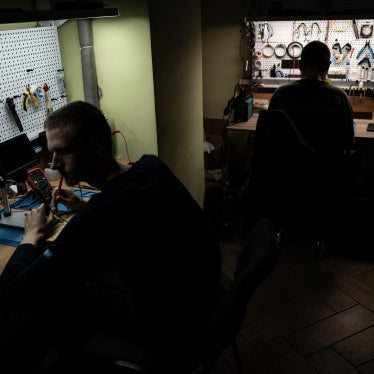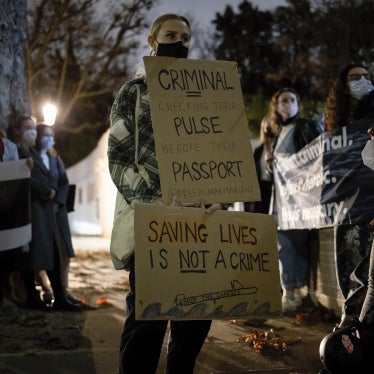Uzbek survivors of torture and the 2005 massacre of unarmed protesters in Andijan have appealed a decision by Germany’s federal prosecutor not to open an investigation against former Uzbek Interior Minister Zokir Almatov, Human Rights Watch said today.
Germany’s federal prosecutor had rejected a December 2005 complaint by the victims, joined by Human Rights Watch, asking the prosecutor to open an investigation against Almatov and 11 other Uzbek government officials for crimes against humanity. The crimes related to the massacre of hundreds of unarmed protesters on May 13, 2005 in the eastern city of Andijan, and the widespread and systematic use of torture in Uzbekistan.
The German government allowed Almatov to travel to Germany shortly before the complaint against him was filed, although the authorities knew he was on a visa ban list about to be announced by the European Union. The federal prosecutor then failed to open an investigation against Almatov as required by Germany’s universal jurisdiction law, the Code of Crimes against International Law.
“Germany’s universal jurisdiction law was adopted to help survivors of serious atrocities who have no hope of getting justice at home,” said Holly Cartner, Europe and Central Asia director at Human Rights Watch. “By refusing to use the law, Germany’s federal prosecutor has exacerbated the environment of impunity that exists for foreign officials accused of crimes against humanity.”
The appeal was submitted last week to the Higher Regional Court in Stuttgart. Wolfgang Kaleck, the lawyer representing the victims and Human Rights Watch, challenged the federal prosecutor’s reasoning for not opening an investigation. The appeal stresses that Germany’s Code of Crimes against International Law obliges the prosecution to investigate alleged international crimes such as crimes against humanity, and that its failure to do so when Almatov was present in Germany cannot now be used as a justification not to do so after he fled back to Uzbekistan.
The appeal also underscores that the federal prosecutor ignored the core principle of universal jurisdiction, which is intended to put an end to impunity for the most horrendous crimes. If this principle is to be respected, states committed to international justice must proactively collect and preserve evidence of such crimes even if they are not immediately able to arrest the accused. Otherwise, universal jurisdiction laws such as Germany’s will remain a paper tiger.
“The facts of this case are exceptionally strong, so Germany’s refusal to open an investigation against Almatov can certainly not be justified by a lack of evidence,” said Cartner.
Background
On December 12, 2005, eight Uzbek victims of abuses, accompanied by Human Rights Watch, submitted a complaint against Almatov to the German federal prosecutor. They asked the prosecutor to open a criminal investigation against Almatov and 11 other Uzbek government officials for crimes against humanity related to the massacre of hundreds of unarmed citizens on May 13, 2005 in the eastern city of Andijan, and for the widespread and systematic use of torture. Almatov commanded the troops that bore primary responsibility for the mass killings in Andijan and, as interior minister, also oversaw Uzbek prisons and pre-trial detention facilities, where torture is routine. Four of the plaintiffs are victims of the Andijan massacre and four are victims of torture.
On March 31, 2006, then-Federal Prosecutor Kay Nehm issued his decision not to go forward with an investigation against Almatov; the decision was later upheld by the current Federal Prosecutor Monika Harms. Nehm argued that the likelihood of a successful investigation and prosecution was “non-existent,” given that Uzbekistan was unlikely to cooperate and an investigation in Uzbekistan would be necessary. The prosecutor apparently gave little weight to the fact that hundreds of victims and potential witnesses now live outside Uzbekistan, including in Germany, Romania, Holland, and Sweden.
The prosecutor appears not to have considered that he could interview international witnesses such as former UK ambassador to Uzbekistan Craig Murray, or former United Nations Special Rapporteur on Torture Theo van Boven, who had declared their willingness to serve as witnesses in the case. As special rapporteur, van Boven issued a report in 2003 documenting the systematic nature of torture in Uzbekistan.
In his decision, the prosecutor relied on information submitted by the government of Uzbekistan claiming to be undertaking various initiatives to combat torture, but he failed to check any of these claims with the UN Special Rapporteur on Torture. He also appears to have ignored the fact that there is no independent access to detention and prison facilities in Uzbekistan and so no mechanism to verify the government’s claims.
The complaint against Almatov was based on German law, which recognizes universal jurisdiction for torture and crimes against humanity. This means German courts can try and punish the perpetrators of such crimes, no matter where the crimes were committed, and regardless of the nationality of the perpetrators and victims. German law does not require that the accused or the victims be in Germany, although Almatov’s presence there was a facilitating factor in his investigation and potential prosecution.
Germany has been a leader in creating accountability mechanisms for the most serious crimes under international law. The German government was a strong supporter of efforts to establish the International Criminal Court, and incorporated that court’s statute of international crimes into its own domestic law. This commitment to international justice reflects Germany’s struggle to come to terms with its own history and its recognition of the importance of bringing to justice those responsible for war crimes, crimes against humanity and genocide.
Germany is exemplary in having passed legislation allowing its courts to exercise universal jurisdiction for such serious human rights crimes, which reflects the principle that some crimes so offend humankind that courts anywhere should have jurisdiction to try them, no matter where they were committed, and no matter the nationality of the accused or the victims.
In August 2006, Harms told Die Zeit newspaper that she wants to contribute to holding accountable those in high offices who perpetrate crimes against humanity. Human Rights Watch urged Federal Prosecutor Harms to use Germany’s Code of Crimes against International Law (Völkerstrafgesetzbuch) for the first time since it was adopted almost five years ago.








